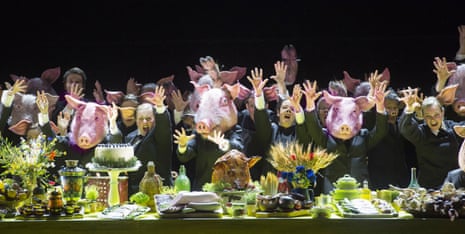The devil wears red in Mussorgsky’s The Fair at Sorochyntsi, an essential clue to following Barrie Kosky’s zany new staging at Berlin’s Komische Oper, where the Australian maverick is both intendant and artistic director. Based on a Gogol story and full of Russian folk idiom, this comic rarity was unfinished at Mussorgsky’s death in 1881. Several attempts have been made to complete it, with a version by the Soviet composer Shebalin used here and considered the most authentic.
Kosky’s triumphs in the UK – at Glyndebourne with Handel’s Saul, at the Royal Opera House with Shostakovich’s The Nose and, less convincingly, at English National Opera with Rameau’s Castor and Pollux – have shot much-needed adrenaline into UK opera in the past decade. The Kosky directorial tics are becoming familiar: stylish choreography, simple sets made stunning with lavish tableaux, saturated colour, prominent use of animal heads (or, in The Nose, noses) and a fondness for bursts of revolting slapstick.
In The Fair at Sorochyntsi, the plot has the usual lineup of folk archetypes including drunken father, pretty daughter, feckless sweetheart and crafty Gypsy. With stark designs and stylish costumes – heavily netted skirts, floral headdresses – by Katrin Lea Tag, this two-hour work has great highlights and inevitable longueurs. All was excellently played, under the baton of Henrik Nánási, with a sturdy ensemble cast. Additional music, by Rimsky-Korsakov and Mussorgsky, arranged by chorus director David Cavelius, provided extra choral opportunities – beautifully lit in near darkness by Franck Evin – to offset some of the drearier solo passages.
Mussorgsky makes quite a meal of the nuisance stepmother’s aphrodisiac baking: three kinds of calorific dumpling to heat the passions of her foppish toyboy lover. Agnes Zwierko did her best, with lively singing and some nimble endeavours with a pudding basin, a few litres of whipped cream and an oven-ready turkey. That said, the diabolic dream sequence in which the sweet peasant lover Gritsko (Australian tenor Alexander Lewis, seen in Royal Opera’s The Nose) encounters a lurid witches’ sabbath was Kosky at his most spectacular. Priests in pigs’ clothing stage a noisy battle to music familiar from Mussorgsky’s A Night on the Bare Mountain. In a feast reminiscent of Glyndebourne’s Saul, a groaning, banqueting table moves forward to reveal a grande bouffe of jellied animal parts, gherkins and what I think were types of cactus. Kosky is back at Covent Garden next year with a new Carmen. Get your fill then.
Another opera house, another world of fevered dreams, another set of bizarre headgear: gazelle, falcon, stag and a family of bunnies. Each year, Berlin Staatsoper’s week-long Festtage, set up by Daniel Barenboim in 1996, mixes concerts and opera, customarily including a revival of Wagner’s Parsifal and a new production. This year the novelty was Richard Strauss’s Die Frau ohne Schatten (The Shadowless Woman), in Claus Guth’s production first seen at La Scala, Milan in 2012 and at London’s Royal Opera House in 2014.
Only Michaela Schuster (Nurse), whose mighty mezzo-soprano soars above the huge orchestra, has sung it in all three cities. The other main roles, notoriously challenging to sing, are superbly interpreted by Camilla Nylund as the Empress of the title, Burkhard Fritz in the impossibly high-flying – though he managed it – part of Emperor, Wolfgang Koch as a touching and world-weary Barak and Iréne Theorin as his thwarted, yearning Wife. Zubin Mehta, not necessarily a first choice for Strauss, though he recently released an eight-CD box set of the composer’s music, gave free rein to the excellent Staatsoper players. With thunder machine, wind machine, glass harmonica, a double viola section, two celestas, organ and two tubas, the orchestral colour is sumptuous as well as delicate. The more you hear it, the more it begins to seem Strauss’s greatest score.
Guth, who makes his Glyndebourne debut this summer with a new La clemenza di Tito, puts bold concepts at the service of powerful storytelling. His productions, preoccupied with doubles, mirror images and split personalities, are often set in beautiful but imprisoning interiors. Frau ohne Schatten is a natural fit for him and his regular designers. Rich with Freudian symbolism, exemplified here by the amount of time the Empress spends wriggling around in bed, the opera was premiered in Vienna in 1919. Strauss’s librettist, Hugo von Hofmannsthal, raises tricky questions about male dominance and female repression, some of which now appear dated. Guth’s perceptive staging gives the work wider application, asking what it is to find a sense of self.
Next year the Festtage, featuring a new Falstaff, will no longer be at the Schiller theatre, the company’s chic 1950s temporary home for the past seven years. After many delays, the restored Staatsoper Unter den Linden will reopen on 3 October.
Barenboim and the Staatskapelle Berlin are among the stars of the 2017 BBC Proms – just announced – playing Elgar’s Symphonies Nos 1 and 2 and a premiere by Harrison Birtwistle. There’s a confident mood in David Pickard’s second season as director: strong programmes, imaginative forays into other styles and cultures, with concerts marking Indian independence and the Russian Revolution, and Handel’s Water Music in Hull. Chineke! orchestra makes its debut. Daily promenading tickets remain an incredible bargain at £6. General booking opens on Saturday 13 May. Spread the word.
Star ratings (out of 5)
The Fair at Sorochyntsi ★★★★
Die Frau ohne Schatten ★★★★★

Comments (…)
Sign in or create your Guardian account to join the discussion